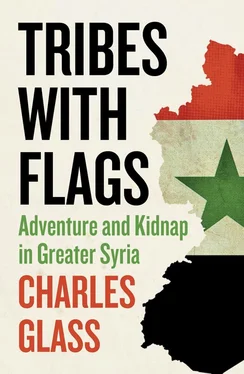Minorities who benefited from the policies of the Alawite minority regime hesitate to turn their backs on it during a time of crisis. Moreover, many Christians view the opposition’s driving force, despite its many secular and liberal adherents, as Sunni fundamentalism battling Alawi upstarts. The fundamentalists, they believe, will deprive them of social freedom in the name of political liberation. An Armenian high school teacher, whom I have known for many years, became uncharacteristically loquacious when explaining her support for the Assad regime:
I’m free. I am safe. … “You’re a kafir [unbeliever]”: I have not heard that phrase for thirty years. At the school, some of my friends are Muslim Brothers. They respect me, and I respect them. Who is responsible for that? … Look at this terror. Is this what Obama wants? Is this what Sarkozy wants? Let them leave us alone. If we don’t like our president, we won’t elect him. This is from a woman who is sixty years old, and I’ve been free for thirty years. I should be afraid to go out? I should cover myself? Women should live like donkeys? … We are citizens. We are equal. Everybody is free with his religion.
She, along with many other Aleppines in the past year, has installed a steel-reinforced front door to her house. This is one sign that the security she and many other Christians felt under Assad père et fils, the regime’s primary justification, is dissipating. Tales of the rape, kidnapping, and murder of Christians in Homs, the city halfway between Aleppo and Damascus that has become this revolution’s Barcelona, have created unease among their coreligionists throughout Syria. In Aleppo, bombs that damaged security force centers took with them nearby Christian apartments, schools, and churches.
Aleppo is tranquil most of the time. There are no soldiers on the streets, and the nightlife that was suspended out of caution in the first months of the rebellion has returned to downtown and the outdoor cafés along Azizieh Square. But, Aleppines of all faiths wonder, for how much longer?
On April 13, Good Friday for the Orthodox churches, I spent the morning walking through the Aleppo Citadel and drinking coffee below its main gate. Families traversed a stone footbridge, supported by seven Roman arches over a dry moat, from a pedestrian plaza at ground level several hundred feet to the Citadel entrance. On the stone walk in front of a row of outdoor cafés, a man in a Nike baseball cap played soccer with his son and daughter, about three and four years old, also in baseball caps. Another little boy with an ice cream cone in one hand chased his father, a tall young man in jeans and tennis shoes. A few families were having breakfast, others coffee and soft drinks. A woman wearing a Superman blue sweater and a matching scarf over her hair promenaded while holding a pink balloon at the end of a bit of string. Beside her were two young women, probably her daughters, in tight slacks, their hair loose on their shoulders. A man pushing a kiosk on bicycle wheels sold cotton candy. The sweet aroma of apple-scented Persian tobacco, smoked through ornate water pipes by women and men, swam though the air. In the dry moat, a half dozen preteens played soccer. Since the conflict began in March 2011, no tourists have checked into the ancient hospital that is now the five-star Carlton Citadel Hotel. Its restaurant terrace, however, filled with Syrians at lunchtime.
In the spring of 1987, also at Eastertime, I made notes in one of these cafés as I was doing twenty-five years later. Thousands of Christians were visiting one another’s churches and exchanging flowers, without provoking so much as an awkward glance from their Muslim neighbors. I was worried about finishing this book, thinking about the next stage of my journey to wartime Lebanon and whether it would be safe in that era of kidnapping foreigners. Syria then seemed solid, unchanged and unchangeable, like the Soviet Union that provided what little international backing it had. The Assad regime had been in place since 1970, the Alawite minority since a coup in 1966, and the Baath Party since 1963. The combined military-party-family structure had survived multiple assaults: the two-year Muslim Brotherhood uprisings in Aleppo and Hama that ended violently in the spring of 1982; Israel’s destruction of its air force and armor that summer in Lebanon; and an attempted putsch by the president’s brother in 1983. Syria’s regime, founded on the primacy of the single party and the army with its intelligence apparatus, resumed control of Lebanon with American approval in 1985, and acquired a Lebanese ally, Hezbollah, whose steady humiliation of the Israeli Army in south Lebanon allowed it to enjoy reflected glory.
For all his political strength and canniness, Hafez al-Assad had a weak heart that made his mortality a source of opportunity for his enemies (Israel Radio announced his death about fifteen years early) and apprehension by his friends. He groomed his toughest, oldest son, as did his fellow dictators in the hereditary republics of Iraq, Egypt, and Libya, to assume power as naturally as the crown princes of Saudi Arabia, Jordan, Oman, and Qatar. That child, Bassel, died in a car crash in 1994, so a younger son, Bashar, was drafted from his London medical studies to assume his brother’s place as heir to the throne. On his father’s death in 2000, Bashar, with his British-born wife at his side, promised reforms that he failed to implement. The Baathist slogan, “Unity, progress, socialism,” still plastered on the Citadel in 1987, was already fading from the assaults of sun and rain. Twenty-five years later, it has disappeared altogether.
Syrians seemed in 1987, if not content, reconciled to a fate that was preferable to the regime of terror they observed in Saddam’s Iraq to their east and the anarchy of Lebanon in the west. (The Lebanese Druze leader, Walid Jumblatt, said of Beirut’s gunmen at the time, “They don’t even obey the law of the jungle.”) The type of dissident intellectuals that Saddam Hussein would torture to death before assassinating their families would in Syria receive a dressing-down from security officials and sometimes a few weeks behind bars to restore them to the path of Baathist righteousness. Torture was reserved for more serious dissidents, the army’s would-be coup-makers and, after 2001, suspected terrorists discreetly transferred to Syrian custody by the CIA. It was cruel; it was efficient; and, until students demonstrated against it in the remote southern border town of Dera’a in March 2011, it was as impregnable as Aleppo’s Citadel.
When Dera’a’s students opened the gate of protest, everyone became a critic of the regime. Even servants of the state complained of corruption among the president’s immediate family and the security services’ use of surveillance, informers, detention and torture to maintain elite privileges. The foreign media officer at the Ministry of Information, an attractive young woman named Abeer Al-Ahmad, surprised me in April 2012 by offering introductions to “opposition leaders.” This would have been unimaginable in 1987, even if they were merely the “official” opponents running in May’s parliamentary elections. The regime allowed the campaign, along with a new constitution and ostensible suspension of the long-standing state of emergency, to meet some of the demands of the real opposition led for the most part by young people in the streets.
The young, born too late to have seen the regime’s suppression of the Muslim Brothers’ rebellions in Aleppo and Hama between 1980 and 1982, came of age during an era of superficial reforms. After Bashar-al-Assad succeeded his father in 2000, government primary and high schools abandoned military-style uniforms for students and granted everyone access to modern telecommunications. (Under his father, even international news agencies had needed government permission to install a fax.) This illusion of liberty seemed to whet an appetite for the substance. Youngsters, who did not share the older generation’s experience of prison and torture, ignored their elders’ caution by calling on other youngsters to join them the streets.
Читать дальше












